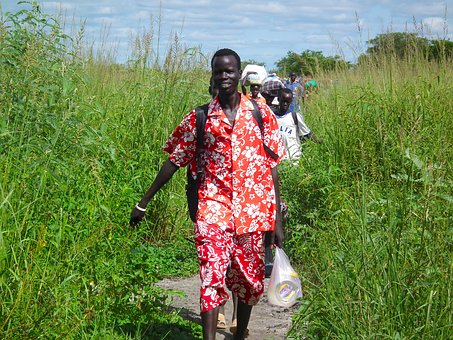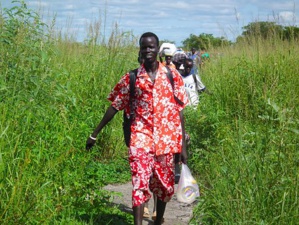Dailycsr.com – 19 November 2018 – More than sixty youths of various countries of African continent came together on August 27, 2018 and August 28, 2018 at the “World Agroforestry Centre”. The age group ranged from eighteen to thirty five and their background spanned across “farmers to leaders of NGOs, small start-ups and rural enterprises”. However, they gathered on a commonly shared goal of restoration.
The programme that initiated the gathering is called “Scaling up youth action to restore Africa’s degraded lands”. It is run by GLF, “Global Landscapes Forum”, as well as the “Youth in Landscapes Initiative”. During the meet, the young participants went through a “practical training” underscoring the science of restoration. In the words of a “GLF youth coordinator”, Salina Abraham:
“Guided by top scientists, this accelerator provides training on restoration principles and good practices. We want them to take those science concepts and link them together to spark a movement in their community.”
While, Desmond Alugnoa, coming from Ghana, added:
“Miners are spoiling our land and threatening our food security. They use cyanide, so the quarries they leave cannot even serve as fish ponds.”
And Nigeria’s John Agboola remarked:
“Pastoralists from countries where land is degraded are destroying our crops”.
As it appears, degrading landscapes are haunting reality of these African youths, as growing population which adds energy demands coupled with unsustainable “soils, trees and forests” uses among other factors have degraded an “estimated 45% of Africa’s land mass”.
Amid the shifting landscape, rivers are drying up while poverty seems to have captured the heart of agriculture, as Lawrence Afere Alaba, founder of an NGO Springboard, said:
“My parents did not want me to become a farmer. They wanted me to be rich”.
“But we are responsible for managing these problems. So, my NGO focuses on farming and better use of land. When we are old, we will ask ourselves, did we actually live well? Did I do what I was created to do?”
The delegates were taken on a learning tour to Karura Forest, which is being restored with “more indigenous trees”. The restoration work manager at the forest, Ely Kogei describes Karura to be the “lungs and kidney of Nairobi” as five rivers are crossing its territory, wherein the water that flow in with “faecal bacteria” pour out as good as in potable form. However, the restoration work faces a great challenge in tackling invasive species like Lantana camara that grow into impenetrable thickets obstructing wildlife activities.
Following the visit to Karura Forest, Uganda’s Amos Amunabo observed:
“I have learnt that patience is so important when you are implementing regeneration”.
Leigh Winowiecki from ICRAF informed that “soil organic carbon” is a key indicator of land health, whereby he added:
“Where you have low carbon, you often have high erosion. To get it back, restore using a whole system approach, including trees and grasses.”
Talking about the part of Uganda, wherein refugees from Southern Sudan have cut down trees, Lalisa Duguma reminded:
“Let’s not take the blaming route. Instead, have a woody plants integration vision for humanitarian settings.”
“We can use farmer-managed natural regeneration, conserve standing trees and promote tree growing. Ask people want they want and see what is ecologically optimal.”
Addressing the fuel business in Africa, Mary Njenga of ICRAF said:
“We do not need to criminalize it. It’s a livelihood many people depend on. We can make it sustainable – manage and convert it well.”
She suggested that the branches pruned from “multipurpose trees” growing in farms can provide firewood “instead of women going to a forest and removing dead wood that could become organic matter and be a good seed bed for regeneration.”
“A tree between 3-6 years can produce 27-40 kg a year. To cook a meal, you need 1 kg/person/day. So, 9-13 trees are what you need to support a person for a year. They can even get a surplus to sell for income.”
References:
3blmedia.com
The programme that initiated the gathering is called “Scaling up youth action to restore Africa’s degraded lands”. It is run by GLF, “Global Landscapes Forum”, as well as the “Youth in Landscapes Initiative”. During the meet, the young participants went through a “practical training” underscoring the science of restoration. In the words of a “GLF youth coordinator”, Salina Abraham:
“Guided by top scientists, this accelerator provides training on restoration principles and good practices. We want them to take those science concepts and link them together to spark a movement in their community.”
While, Desmond Alugnoa, coming from Ghana, added:
“Miners are spoiling our land and threatening our food security. They use cyanide, so the quarries they leave cannot even serve as fish ponds.”
And Nigeria’s John Agboola remarked:
“Pastoralists from countries where land is degraded are destroying our crops”.
As it appears, degrading landscapes are haunting reality of these African youths, as growing population which adds energy demands coupled with unsustainable “soils, trees and forests” uses among other factors have degraded an “estimated 45% of Africa’s land mass”.
Amid the shifting landscape, rivers are drying up while poverty seems to have captured the heart of agriculture, as Lawrence Afere Alaba, founder of an NGO Springboard, said:
“My parents did not want me to become a farmer. They wanted me to be rich”.
“But we are responsible for managing these problems. So, my NGO focuses on farming and better use of land. When we are old, we will ask ourselves, did we actually live well? Did I do what I was created to do?”
The delegates were taken on a learning tour to Karura Forest, which is being restored with “more indigenous trees”. The restoration work manager at the forest, Ely Kogei describes Karura to be the “lungs and kidney of Nairobi” as five rivers are crossing its territory, wherein the water that flow in with “faecal bacteria” pour out as good as in potable form. However, the restoration work faces a great challenge in tackling invasive species like Lantana camara that grow into impenetrable thickets obstructing wildlife activities.
Following the visit to Karura Forest, Uganda’s Amos Amunabo observed:
“I have learnt that patience is so important when you are implementing regeneration”.
Leigh Winowiecki from ICRAF informed that “soil organic carbon” is a key indicator of land health, whereby he added:
“Where you have low carbon, you often have high erosion. To get it back, restore using a whole system approach, including trees and grasses.”
Talking about the part of Uganda, wherein refugees from Southern Sudan have cut down trees, Lalisa Duguma reminded:
“Let’s not take the blaming route. Instead, have a woody plants integration vision for humanitarian settings.”
“We can use farmer-managed natural regeneration, conserve standing trees and promote tree growing. Ask people want they want and see what is ecologically optimal.”
Addressing the fuel business in Africa, Mary Njenga of ICRAF said:
“We do not need to criminalize it. It’s a livelihood many people depend on. We can make it sustainable – manage and convert it well.”
She suggested that the branches pruned from “multipurpose trees” growing in farms can provide firewood “instead of women going to a forest and removing dead wood that could become organic matter and be a good seed bed for regeneration.”
“A tree between 3-6 years can produce 27-40 kg a year. To cook a meal, you need 1 kg/person/day. So, 9-13 trees are what you need to support a person for a year. They can even get a surplus to sell for income.”
References:
3blmedia.com


 ICRAF Trains The African Youths On Landscape Restoration
ICRAF Trains The African Youths On Landscape Restoration





 Companies
Companies